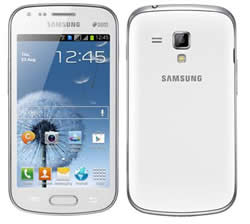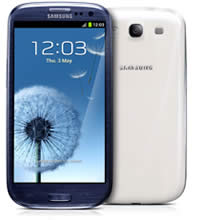Difference between Samsung Galaxy S Duos and Samsung Galaxy S3
Key difference: Samsung Galaxy S Duos is a dual-SIM phone that was launched in September 2012. The phone comes with a 4-inch TFT capacitive touchscreen, with approximately 233 ppi density. The device comes with Samsung’s TouchWiz UI on Android 4.0.4 ICS. The Galaxy S3 is a slate-format multi-touch smartphone that was launched in May 2012. It is the successor of Galaxy S2 and Galaxy S but abandons the rectangular design of the predecessors and opts for more rounded corners making it resemble the Galaxy Nexus. The S3 sports a 4.8 HD Super AMOLED screen with corning gorilla glass 2.

Initially smartphones would come in two categories, the no-nonsense simple phone and the extravagant phone with loads of features and a high price tag. However, now there are many people who expect different things from their phone, including features but a lesser price tag, durability, more battery power, etc. This has enabled smartphone manufacturers to offer an array of different phones for the different types of customers. Samsung announced the Galaxy S Duos as an option aimed for people that require double SIM capability, eliminating the need for carrying two separate phones. The phone was launched in September 2012.
At first glance, the Samsung Galaxy S Duos bears heavy resemblance to the company’s flagship phone, the Samsung Galaxy S3. However, looking past the basic form of the phone and picking it up; the user can realize the reason for such a small price tag. The phone is a cheaper version of its big brother, with a lesser quality plastic and some downgraded features. However, let’s not label it as of yet, as it does come with some good specs. The 4-inch TFT capacitive touchscreen, with approximately 233 ppi density, is pretty decent with good contrast and colors but it is too reflective under sunlight, making it a bit difficult to use outdoors without squinting or trying to cover the screen.
The phone itself is easy to hold and handle, making it sleek and small enough to slip into jeans pockets or a small purse when on the go. The 120 grams of weight also ensures that the phone does put that much pressure on the hands when holding the device for longer periods of time. The top of the device houses only the 3.55 mm jack, while the bottom only has the USB/charging port. The right side of the device holds the power button on the top right hand and the microSD card slot. The left side of the device only holds the volume rocker, a bit hard to reach, if a person is used to having it on the right. On the front, the device has the home button that is surrounded by capacitive more options and a back button.
The device comes with Samsung’s TouchWiz UI on Android 4.0.4 ICS. Again, the UI is a toned down version of the one found on the S3. The device lacks the ripples effect and the water-drop sound and has four customizable shortcut buttons on the bottom of the lockscreen that can directly take you to apps such as missed phone calls when unlocking the device. The device allows users to add/remove apps from the homescreen as well as add/remove panels similar to other versions of Android.
The device is powered by a 1 GHz Cortex-A5, with about 786 MB of RAM. The RAM is a slight upgrade to the 512 MB available on other phones, but it still isn’t that great when trying to run dual-SIM, resulting in some lagging during operation. The dual-SIM capability and standby allows both SIMs to be operational at the same time. The device comes with a 5 MP rear camera for taking photos and recording videos. The rear camera is pretty decent in terms of taking photos. The images have pleasing colors and a good dynamic range, but the photos are a bit grainy. The phone also comes with features such as smile detection, geo-tagging, Share shot, effects and panorama mode. The S Duos also houses a VGA (0.3 MP) front camera that is as okay, nothing much to talk about. The phone can also capture videos in VGA resolution at 30fps.
The S Duos comes with a decent removable LI-Ion 1500 mAh battery, that according to the company provides a talk time of 770 minutes in 2G and 520 minutes in 3G, along with a standby time of 570 hours in 2G and 470 hours in 3G. The phone does not come with the same amount of features as available in Galaxy S3, but with the price tag of this device, it is still something. The main reason for purchasing the phone would still be the dual-SIM capability, while in other countries where dual-SIM options are more common, the phone may not fare as well.
 Samsung Group is a South Korean chaebol, the largest in South Korea. A chaebol is basically a conglomerate. Samsung Electronics has become one of the key competitors in the smartphone market due to innovative technologies. Samsung S2 and Samsung S3 are two smartphones that have been launched by Samsung. They are the successors to the company’s flagship phone Galaxy S. The Samsung S2 made waves in the smartphone market and the S3 has continued the success.
Samsung Group is a South Korean chaebol, the largest in South Korea. A chaebol is basically a conglomerate. Samsung Electronics has become one of the key competitors in the smartphone market due to innovative technologies. Samsung S2 and Samsung S3 are two smartphones that have been launched by Samsung. They are the successors to the company’s flagship phone Galaxy S. The Samsung S2 made waves in the smartphone market and the S3 has continued the success.
The Galaxy S3 is a slate-format multi-touch smartphone that was launched in May 2012. It is the successor of Galaxy S2 and Galaxy S but abandons the rectangular design of the predecessors and opts for more rounded corners making it resemble the Galaxy Nexus. The S3 sports a 4.8 HD Super AMOLED screen with corning gorilla glass 2. It is offered with Android v4.0.4 (Ice Cream Sandwich) and can be upgraded to 4.1.2 (Jelly Bean). The Galaxy S III has a polycarbonate plastic chassis and is available in a variety of different colors. The S3 supports a 1.4 GHz Cortex-A9 Quad-core processor, Mali-400MP GPU and 1 GB RAM. The S3 is available with 16 or 32 GB internal storage capacity, which can be expanded up to an additional 64 GB.
The phone boasts an 8 megapixel Auto Focus camera with flash, zero shutter lag and BSI. It also supports a 1.9 megapixel secondary camera that is capable of recording HD videos @30fps. When the phone was initially launched in May, the phone was considered to have been backed with innovative features and the TouchWiz "Nature UX" GUI was considered to be advanced. The GUI also included the “Water Lux” effect which can produce water ripples on contact. The phone also offered S Voice in response to Apple’s Siri, which enabled users to verbally control 20 functions on the phone. It was effectively considered as a iPhone killer. It also received additional publicity because of the ongoing patent infringement lawsuits against Apple.
The information for the detailed table about the two devices has been taken from Samsung website and GSMArena.com
|
|
Samsung Galaxy S Duos |
Samsung Galaxy S3 |
|
Launch Date |
September 2012 |
May 2012 |
|
Company |
Samsung |
Samsung Electronics |
|
Size |
121.5 x 63.1 x 10.5 mm |
136.6 x 70.6 x 8.6 mm |
|
Display |
4.0-inch TFT capacitive touchscreen |
4.8 inch HD Super AMOLED |
|
Screen |
480 x 800 pixels (~233 ppi pixel density) 16M colors |
1280x720 pixels |
|
Protection |
No |
Corning Gorilla Glass 2, oleophobic fingerprint-resistant coating. |
|
Weight |
120 grams |
133 g |
|
2G Network |
GSM 850 / 900 / 1800 / 1900 - SIM 1 & SIM 2 |
2.5G (GSM/ GPRS/ EDGE): 850/900/1800/1900 MHz |
|
3G Network |
HSDPA 900 / 2100 - SIM 1 & SIM 2 |
(HSPA+ 21Mbps): 850/900/1900/2100 MHz |
|
4G Network |
N/A |
Depends on market availability. |
|
GUI |
TouchWiz 4.0 UI |
TouchWiz "Nature UX" |
|
CPU speed |
1 GHz Cortex-A5 |
Quad-core 1.4 GHz Cortex-A9 |
|
GPU |
Adreno 200 |
Mali-400MP |
|
OS |
Android OS v4.0 (Ice Cream Sandwich) |
Android OS, v4.0.4 (Ice Cream Sandwich), upgradeable to 4.1.2 (Jelly Bean) |
|
Chipset |
Qualcomm MSM7227A Snapdragon |
Exynos 4412 Quad |
|
RAM |
768 MB |
1 GB |
|
SIM Size |
miniSIM (Dual-SIM handset) |
microSIM |
|
Internal Memory |
4 GB (1.8 GB available to the user) |
16/32/64 GB (The 64GB model has been discontinued) |
|
Expandable Memory |
Up to 32 GB |
microSD up to 64 GB |
|
Sensors |
Accelerometer, Geo-magnetic, Proximity Sensor |
Accelerometer, RGB light, digital compass, proximity, gyro, barometer |
|
Connectivity |
GSM; EDGE/GPRS (850/900/1,800/1,900MHz); HSDPA 7.2; Wi-Fi 802.11b/g/n 2.4GHz; Wi-Fi Direct; Bluetooth |
WiFi a/b/g/n, WiFi HT40, GPS/GLONASS, NFC, Bluetooth® 4.0(LE), microUSB v2.0, USB On-the-go, wireless charging. |
|
Data |
GPRS, EDGE, WLAN, Bluetooth, USB. |
GPRS, EDGE, WLAN, Bluetooth, NFC and USB. |
|
Speed |
HSDPA, 7.2 Mbps; HSUPA, 5.76 Mbps |
HSDPA, 21 Mbps; HSUPA, 5.76 Mbps |
|
WLAN |
Wi-Fi 802.11 b/g/n, Wi-Fi hotspot |
Wi-Fi 802.11 a/b/g/n, dual-band, DLNA, Wi-Fi Direct, Wi-Fi hotspot |
|
Bluetooth |
Bluetooth v3.0 with A2DP |
Bluetooth 4.0 with A2DP, EDR. |
|
USB |
microUSB v2.0 |
micro-USB 2.0; USB On-the-go. |
|
Primary Camera |
5 MP CMOS rear camera |
8 megapixel Auto Focus camera with Flash & Zero Shutter Lag, BSI. |
|
Secondary Camera |
VGA CMOS front camera |
1.9 Mega pixel camera, HD recording @30fps with Zero Shutter Lag, BSI |
|
Video |
VGA@30fps |
1080p@30fps, zero shutter lag. |
|
Camera Features |
|
|
|
Sound Enhancement |
No |
Active noise cancellation with dedicated mic. |
|
Audio supported formats |
AAC, AAC+, AMR, AMR-NB, AMR-WB, eAAC+, I-Melody, IMY, M4A, MIDI, MP3, OGG, SP-Midi, WAV, WMA |
Audio Codec: MP3, AMR-NB/WB, AAC/AAC+/eAAC+, WMA, OGG, FLAC, AC-3, apt-X. |
|
Video supported formats |
MPEG4, H.263, H.264 |
Video Codec: MPEG4, H.264, H.263, DivX, DivX3.11, VC-1, VP8, WMV7/8, Sorenson Spark Recording & Playback: Full HD (1080p). |
|
Battery Capacity |
Removable Li-Ion 1500 mAh battery |
2100 mAh battery |
|
Talk time |
2G: 770 minutes 3G: 520 minutes |
2G: 21 hours 40 minutes 3G: 11 hours 40 minutes |
|
Stand-by |
2G: 570 hours 3G: 470 hours |
2G: 590 hours 3G: 790 hours |
|
Available Colors |
White, Black, La Fleur |
Pebble blue, Marble white, Amber brown, Garnet red, Sapphire black, Titanium grey, La Fleur |
|
Messaging |
SMS (threaded view), MMS, Email, Push Email |
SMS(threaded view), MMS, Email, Push Mail, IM, RSS |
|
Browser |
HTML, Adobe Flash Lite |
HTML, Adobe Flash |
|
Radio |
Stereo FM radio with RDS |
Stereo FM radio with RDS |
|
GPS |
GPS with A-GPS support |
A-GPS support and GLONASS |
|
Java |
Java via Java MIDP emulator |
Java MIDP emulator |
|
Additional Features |
|
|
Images Courtesy: samsung.com









Add new comment